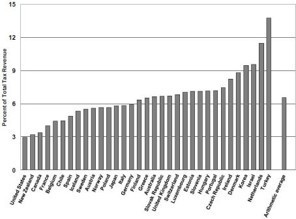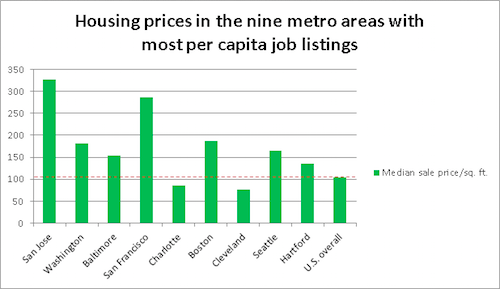Matthew Yglesias's Blog, page 2289
June 2, 2011
The Declining 'Need' For Doctors

Looking back on it, I don't think I expressed my point about technology and the quantity of teachers very well the other day. One way of getting at one I mean about this might be to ask yourself about the past 100 years' worth of growth in the number of doctors.
Think back to 1911. We had some doctors. They provided some health care. The quality of the care they offered wasn't very good, but there it was. Since that time, we've had a lot of economic growth, a lot of technological improvement, etc. One thing that we could have done during that time span was looked at the 1911 standard of health care and tried to hold that roughly constant over time. If we had done that, we would find that with every passing decade we "need" fewer and fewer doctors per capita to provide the same standard of care. Cheap automobiles would reduce the doctor-density needed to provide a 1911 level of coverage. Then over time we'd move to a system where the vast majority of doctors just sit in a big room and field calls from people with health questions. It'd be like the Butterball Turkey Hotline. They'd guesstimate what medicine you need and you'd get your prescription filled at the pharmacy. Over time, phone calls would get cheaper and then with the Internet you'd be able to get passive diagnosis, public health info, etc. The quality of health care provided by this system would be pretty deplorable, but that's the point. You're taking 1911 health care quality and asking how many doctors you "need" to achieve it. And the answer is "not very many."
Clearly, though, this isn't what's happened in the health care sector. Instead, better health care technology has led us to want more health care professionals. A lot more! So with education, too, the mere fact that we may "need" fewer teachers in the future doesn't tell us very much about what's actually going to happen.


Lack Of Left Flank To Monetary Policy Debate Has The Fed Stuck In Neutral

Binyamin Applebaum has a tragic article in The New York Times about how no help's coming to the labor market that features a quote that sends shivers down my spine. He speaks to Eric Rosengren, President of the Boston Fed and generally one of the good guys, and President Rosengren explains that monetary policy won't be coming to the rescue not so much because it can't as because of political paralysis:
"We've done things that are quite unusual. We're using tools that we have less experience with," Mr. Rosengren said. "Most of the criticism has been that we're being too accommodative. That is a concern that we have to put some weight on."
Heather Boushey, senior economist at the Center for American Progress, a liberal research group, said that the Fed was being too cautious about inflation and too callous about joblessness.
"We have a massive unemployment problem in this country right now. It is festering. It's not good for our economy. It's not good for our society. And we have the tools to fix it," she said. "We certainly need to be concerned about what happens down the road, but shouldn't we first be concerned about getting the U.S. economy back on track?"
Obviously, I agree with my colleague. But part of what we're seeing here are the policy consequences of the progressive movement's strange monetary policy blindness. For the Fed to do anything "unorthodox" naturally opens the institution up to criticism. And if nearly 100 percent of the criticism is either from the hard money right or else is vague condemnations of "bailouts," then this biases policy toward inaction. People need to understand that in economic policy terms, the Fed's monetary policy committee is the single most important institution in the country. It's not the only thing that matters, but it matters a lot. Talking about jobs without talking about the FOMC is like talking about the legal system and forgetting there's a Supreme Court. Folks in Minneapolis for Netroots Nation this year should come to my panel on monetary policy.
In other news, this Matt Rognile post from last week is a good money-focused explanation of how mortgage losses could trigger such a huge recession.


Breakfast Links: June 2, 2011
— Education Department hands down regulation on subprime colleges.
— Why do people give Cleveland such a hard time?
— The euro is in big trouble.
— Everybody hates Medicare privatization.
— The rise of "bikini-ready."
— Ward boundaries shouldn't matter so much.
— The case against .
— How real is China's growth?


June 1, 2011
The Fab Five Colleges For Low-Income Students

Education Trust set out to offer low-income students some guidance about which colleges might be the best bet. They were looking for schools that met the following criteria:
— They enroll a proportion of low-income students that is at least as high as the national average.
— They ask these students to pay a portion of their family income no greater than what the average middle income student pays for a bachelor's degree.
— They have a graduation rate of at least 50 percent.
Turns out only five schools in the whole country fit the bill. So congratulations to the CalState Fullerton, CalState Long Beach, Baruch College and Queens College (both CUNY), and UNC-Greensboro. Rich kids graduating from a fancy school this spring and possessed of a hankering to give money to a college might want to look at those options.


A Venture Capitalist Makes The Case Against Software Patents

Here's a great little post from venture capitalist Fred Wilson venting his rage at America's growing empire of software patents. Key sentence: "these 'developers in a garage' can't afford lawyers to represent themselves in a fight with a patent troll."
He also says "I can't understand why our goverment allows this shit to go on," but the earlier point makes it clear. The same firms that can afford lawyers to represent them in a fight with a patent troll can afford lobbyists and host fundraisers. Those firms have employees who want the firm to prosper. And the lawyers have lobbyists and host fundraisers and have employees of their own. Hypothetical future companies can't go back in time and press for less incumbent-friendly policies.


The Progressive Case For The Miami Heat

I'm rooting for the Miami Heat against the Dallas Mavericks in the NBA Finals and not just because my girlfriend is a die-hard San Antonio Spurs fan. As an old-time Knicks fans from the good old days of the nineties Knicks-Heat slugfests, it's been tough for me to reconcile myself to the pro-Heat posture, but it's the correct one. The entire construct in the press that's gotten LeBron James labeled History's Greatest Monster for his defection to Miami is fundamentally wrongheaded and anti-labor.
What we're looking at, essentially, is the case of King James Versus The Cartel. The NBA's maximum salary rules prevent stellar players like James from earning a market wage. Consequently, LeBron was underpaid in Cleveland, is underpaid in Miami, and would have been underpaid in New York or Chicago. What's more, the NBA's draft rules prevent stellar prospects like the 2003 version of LeBron James from choosing which firm they want to work for. If the Lakers wanted to pay him to play basketball and he wanted to play basketball in Los Angeles in exchange for money, he wasn't allowed. Essentially the only market power a first-rate NBA player has is that (assuming he's off his rookie deal) he's allowed to choose which firm will underpay him. The construction of James (and to a lesser extent Chris Bosh) as a traitor to the people of Cleveland (and to a lesser extent Toronto) seeks to normatively stigmatize the exercise of even that freedom. A player should work, indefinitely, at a sub-market wage for whatever team happens to draft him? Why?
Was "The Decision" kind of tasteless? Yes. But we all have our lapses and LeBron's lapse raised money for charity. Did the biggest social faux pas of your life raise money for charity? I'm guessing it didn't. Nobody needs to cry for rich NBA stars, but the idea that the even-richer people who own the teams have a moral right to their labor is nuts.


Memo To Anthony Weiner: Never Resign!
With the strange Anthony Weiner story seemingly gaining momentum, I think it's time to revive my basic advice for surviving a sex scandal:
1. Be an incumbent.
2. Don't resign.
If Weiner doesn't resign, what's going to happen to him? Will he lose a primary? Ha! Will a Republican beat him? Double ha! People survive much crazier scandals all the time. The key thing is to keep your wits about you, and refuse to resign.


America Needs Pollution Taxes
Brad Plumer flags an IMF paper (about Mauritius, as it happens) that offers a convenient chart showing that the United States raises the least revenue from environmental taxation of anyone in the OECD:

Bad stuff. At a moment of rising deficit panic, turning this around should definitely be on the table.


Adventures In Rent-Seeking: Shopping Mall Parking Edition

Many thanks to the eagle-eyed Floridian who sent me "Restaurants in Pembroke Gardens fear competition from incoming Cheesecake Factory", which is basically a sum of all fears Matt Yglesias blog post. The basic facts of the case are that the tenants of a shopping mall don't like the fact that the owner of the shopping mall wants to lease some space to a Cheesecake Factory:
Restaurants in Pembroke Gardens want to block an incoming Cheesecake Factory for fear it will take a bite out of their business. The mall's current tenants include big chains like Brio Tuscan Grille and Fuddruckers, with just a few smaller operations. Still, out of the shopping center's nine full-service restaurants, six — the Village Tavern, Brio, Fuddruckers, Ra Sushi Bar Restaurant, Stir Crazy and The Pub — are worried, said realtor Jeffery R. Anderson.
And of course they should be worried! Every businessman in America should be constantly worried that new entrants are going to cut into his profit margins. But every customer in America should be constantly excited about the possibility of new entrants improving their options. But sadly for America, the rent-seeking incumbent restauranteurs have a plan—parking regulations!
The Village Tavern and Fuddruckers have hired attorney Albert Frevola of Broward litigation firm Conrad Scherer. Frevola said he will argue at the June meeting that the Cheesecake Factory should not be allowed to set up shop in Pembroke Gardens because it will create a parking nightmare.
On the one hand, the Cheesecake Factory will put them out of business by poaching their customers. But on the other hand, the Cheesecake Factory's existence will lead to such a large net increase in customers that it needs to be banned. But of course this isn't really about parking, it's about stopping the Cheesecake Factory from opening:
The city doesn't actually have the power to block the Cheesecake Factory, since it's Duke Reality's decision who they rent to, Rose said. But if the commission changed the legally required number of parking spaces, that would force Pembroke Gardens to come up with more spaces if Cheesecake Factory plans to come in.
"Or, Cheesecake Factory doesn't come in," Frevola added.
I like to think Frevola finished that up with a cackling laugh or some kind of Dr Evil pink to the mouth gesture.


Moving To Job Opportunities Is An Expensive Proposition (Unless You Go To Cleveland)
On Ryan Avent's twitter feed this morning he made the observation that this list of the top ten cities for job openings per capita also includes some of America's most expensive metropolitan areas. Intern to the blog stars Matt Cameron quantified this a bit more rigorously by looking up Zillow's data on home sale prices per square foot. Data wasn't available for Austin, number ten on the job opportunities list, so we've got the other nine:

In seven out of nine cases, the hot job markets are more expensive than average. This means that it may be very difficult for the typical American to afford to relocate to the Bay Area or the DC-Baltimore area even though these are places where jobs are plentiful. Charlotte and Cleveland are both considerably smaller, so the high ratio of job opportunities to people represents a small total number of jobs, but moving to those cities is a much cheaper proposition.


Matthew Yglesias's Blog
- Matthew Yglesias's profile
- 72 followers



